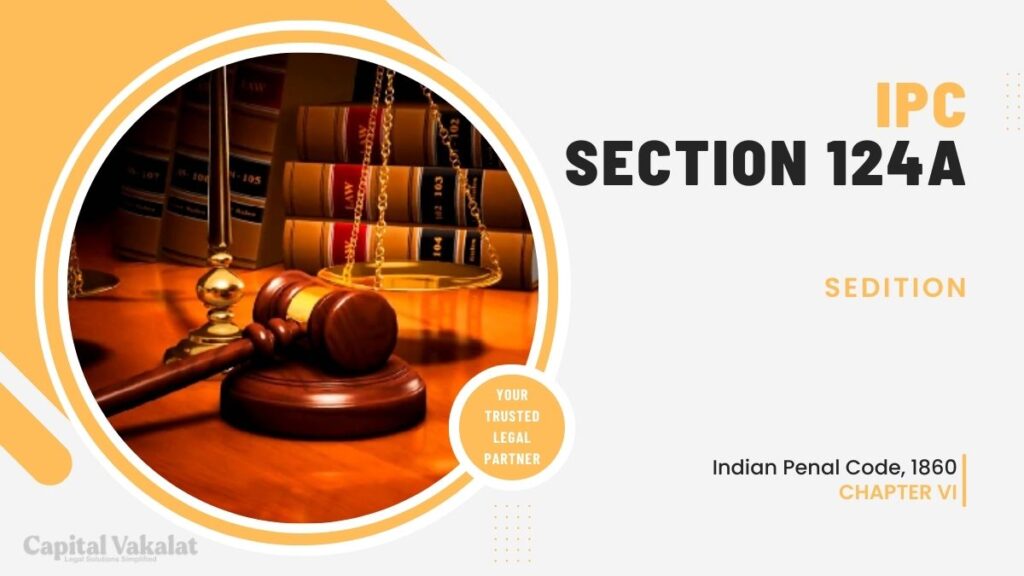Sedition, as defined under Section 124A of the Indian Penal Code (IPC), has been a topic of considerable debate and controversy in India for many years.

This article delves into the various aspects of Section 124A IPC, its historical background, elements, and the impact it has on freedom of speech and expression in the country.
Introduction
Section 124A of the Indian Penal Code deals with the offense of sedition. It was introduced during the British colonial era in 1870. Sedition essentially pertains to any act or expression that brings or attempts to bring hatred or contempt towards the government established by law in India.
Understanding Section 124A IPC
This section, under Chapter VI of the IPC, is aimed at curbing activities that can disrupt public order and challenge the authority of the government. However, it has been a subject of controversy due to its potentially wide scope of interpretation and misuse.
Historical Background
The sedition law was enacted during the colonial rule to suppress dissent against the British government. The British colonial authorities used it to stifle the Indian freedom struggle and silence those who spoke against their oppressive rule.
Elements of Sedition
Expressions and Disaffection
To be charged under Section 124A, there must be a clear expression of disaffection towards the government. Mere criticism is not enough; it must incite violence or public disorder.
Incitement to Violence
Sedition charges require proof that the accused aimed to incite violence or public unrest. This element is crucial in distinguishing legitimate criticism from seditious acts.
Interpretation of Section 124A IPC
Over the years, various court cases have shaped the interpretation of this section. Landmark cases, such as the Kedar Nath Singh vs. State of Bihar case, have clarified the scope of sedition.
Freedom of Speech vs. Sedition
One of the key debates surrounding sedition is the clash between freedom of speech and the need to maintain law and order. Balancing these conflicting interests remains a significant challenge.
The Controversy Surrounding Sedition
Misuse of the Law
Critics argue that Section 124A has often been misused to suppress dissent and silence political opposition, making it a tool for the powerful to curtail free expression.
Sedition Laws Worldwide
Comparisons with sedition laws in other countries highlight the unique nature of India’s approach to this offense. Many democracies have abolished or significantly reformed sedition laws.
Impact on Freedom of the Press
The sedition law has a direct impact on journalists and media outlets, often leading to self-censorship for fear of legal repercussions. This affects the vibrancy of India’s media landscape.
Public Opinion and Section 124A IPC
Public opinion regarding sedition laws in India is divided. Some believe it is necessary for maintaining order, while others argue that it infringes upon civil liberties.
Reforms and Debates
There have been ongoing debates on whether Section 124A should be amended or abolished. Calls for reforms have gained momentum in recent years, reflecting a changing societal perspective.
Conclusion
In conclusion, Section 124A of the IPC, dealing with sedition, is a highly contentious legal provision in India. It has deep historical roots, but its misuse and impact on freedom of speech and the press raise crucial questions about its relevance in modern India.
FAQs
What is the historical context of Section 124A?
The sedition law was introduced during the British colonial era to suppress dissent against the British government.
How is sedition defined in the law?
Sedition requires a clear expression of disaffection towards the government and incitement to violence or public disorder.
How does sedition impact freedom of speech?
Sedition laws can potentially infringe upon freedom of speech and lead to self-censorship among journalists and media outlets.
Are there ongoing debates about reforming sedition laws?
Yes, there are ongoing debates and calls for reforms to amend or abolish Section 124A of the IPC in India.